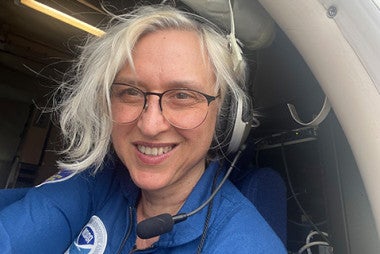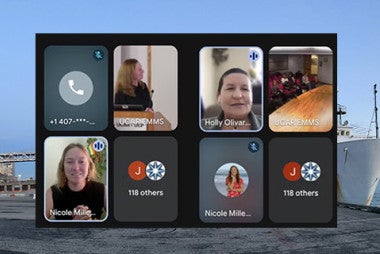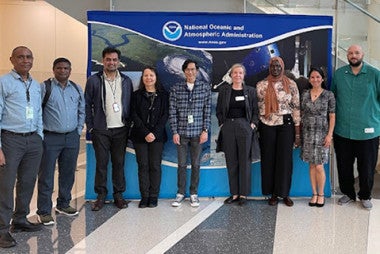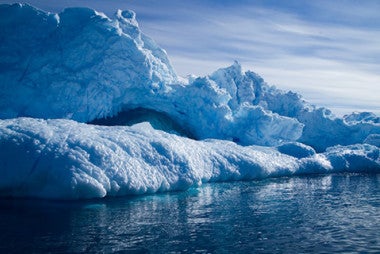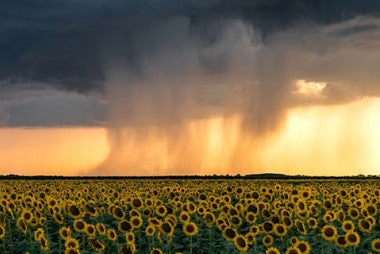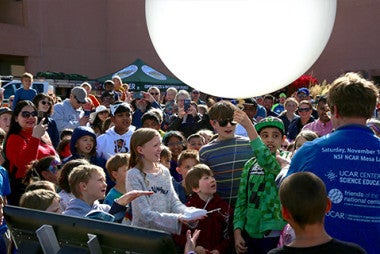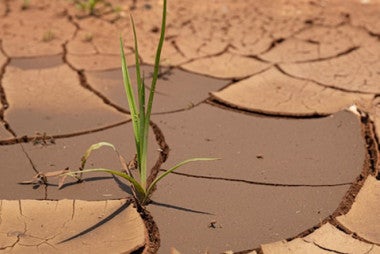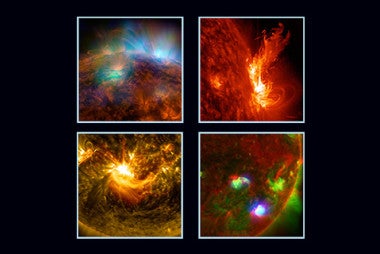Open Science Applied Across Heliophysics Disciplines
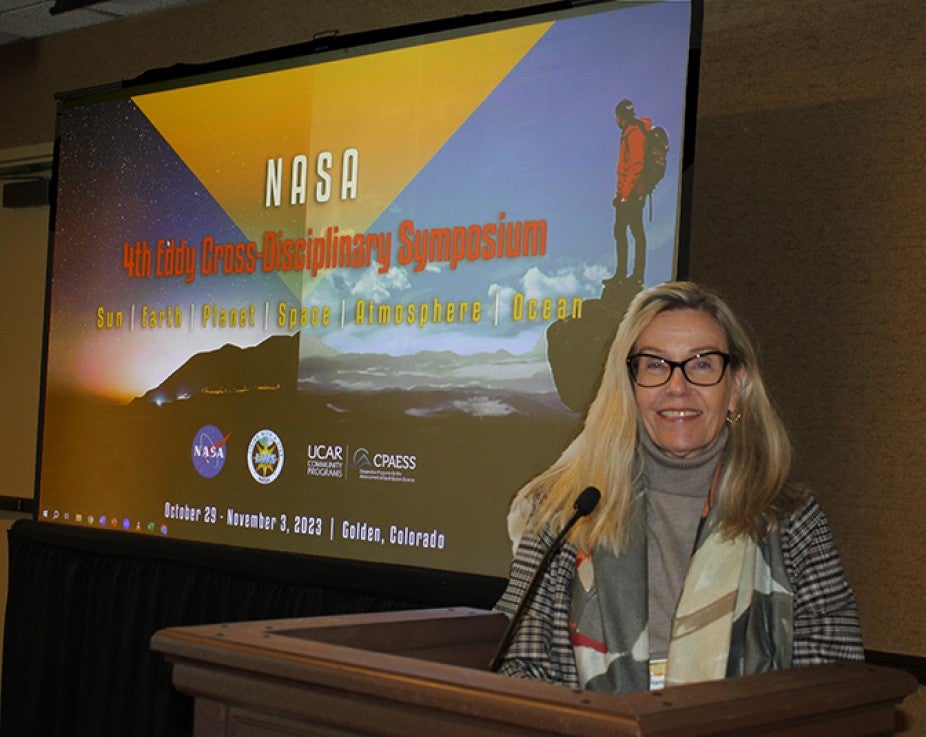
SPS | CPAESS Director Hanne Mauriello opens up the 4th Eddy Cross-Disciplinary Symposium.
From October 29 - November 3, 2023 the 4th Eddy Symposium was held in Golden, Colorado with the first snowfall of the season. This event continues the legacy of the frontier-thinking, cross-disciplinary gathering that the Eddy Symposia have come to define. The overarching theme of the 4th Eddy Symposium was “Why Grand Challenges in Solar Terrestrial Physics Require Open Science and How to Achieve It?”
The event was quite international with students from across the globe invited to present and participate. After an introduction from the symposium’s catalyst, Dr. Madhulika “Lika” Guhathakurta NASA Senior Advisor, the gathering was opened by Dr. Gavin Schmidt, Director of NASA Goddard Institute for Space Studies on “Progress in modeling solar-climate interactions.” Each day numerous presentations were given following themes, and each afternoon the assemblage was sorted into working groups. The working groups focused on the different themes and discussions focused on how to further the application of Open Science through the three focused areas:
- The Interconnection of Sun, Climate, and Society
- Risk and Resiliency to Space Weather Disruption
- (Exo)Planetary Atmosphere: the Impact of Stars and Solar Physics on Habitability & Life
A broad spectrum of issues were covered over the course of the week from “If It’s Not Open, It’s Not Science” from Greg Kopp, University of Colorado / LASP; to “The Power of Open Data – a Grid Hazard Analysis” from Jennifer Gannon, VP of R&D at Computational Physics, Inc.; to “CryoCloud: Accelerating scientific discovery for Cryosphere communities with the open cloud infrastructure” with Tasha Snow, Colorado School of Mines; and “The Sun-Earth System in Time: Searching For Habitable Earth-like Exoplanets” with Vladimir Airapetian, NASA Goddard Space Flight Center, Greenbelt, MD and American University, Washington, DC as some examples. On Wednesday evening a banquet was held with guest speaker Holly Gilbert, Director of the NCAR High Altitude Observatory (HAO) on “A Piece of the Space Weather Puzzle: Understanding Solar Magnetism.” Talks were filmed for future use and participants on Slack asked questions of the speakers. See the agenda and videos do see the presentations.
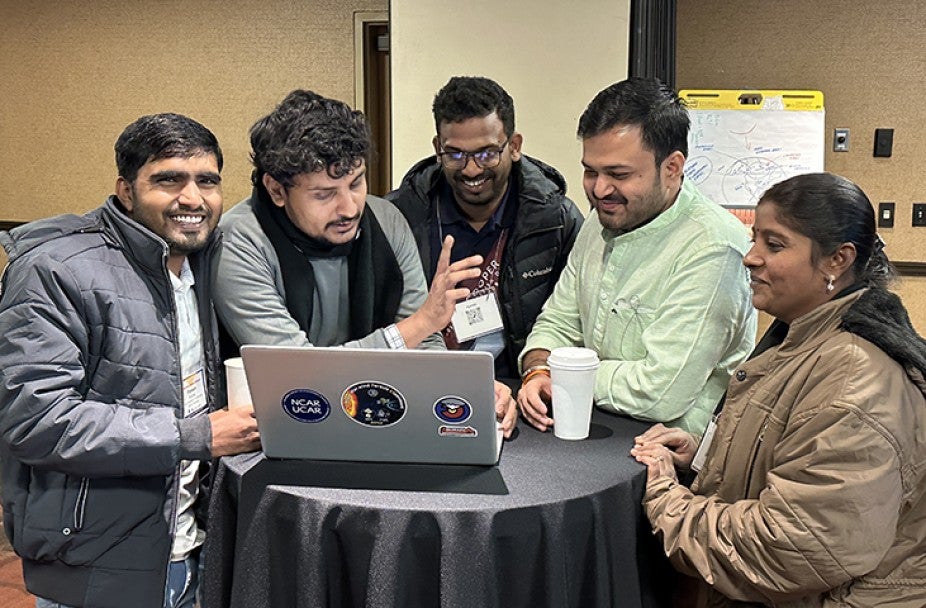
Graduate students from India who presented at the 4th Eddy Symposium. From left to right: Pawan Kumar, Kalpesh Ghag, Omkar Dhamane, Souvik Roy, and Vijayalakshmi Prakash.
Our students were very excited to meet leaders in the many interdisciplinary fields touching these interconnected themes. Besides giving presentations to the group, these students were able to become integral to the working groups. Many were very excited to make this journey for the event. For several students, this was their first journey to the United States. Both Kalpesh Ghag and Omkar Dhamane were written up in their local papers for presenting at this symposium.
The 4th Eddy Cross-Disciplinary Steering Committee included Dan Marsh (co-chair), University of Leeds; Ryan McGranaghan (co-chair), NASA Jet Propulsion Laboratory; Erika Palmerio, Predictive Science, Inc.; King-Fai Li, University of California Riverside; Ankush Bhaskar, India Space Research Organization; Meng Jin, Lockheed Martin; Jim Colliander, 2i2c; Rajesh Gupta, Department of Energy Science and Engineering, IIT Bombay; and Madhulika Guhathakurta, NASA Senior Advisor. Your contributions and insight in directing to this cutting-edge symposium are greatly appreciated.
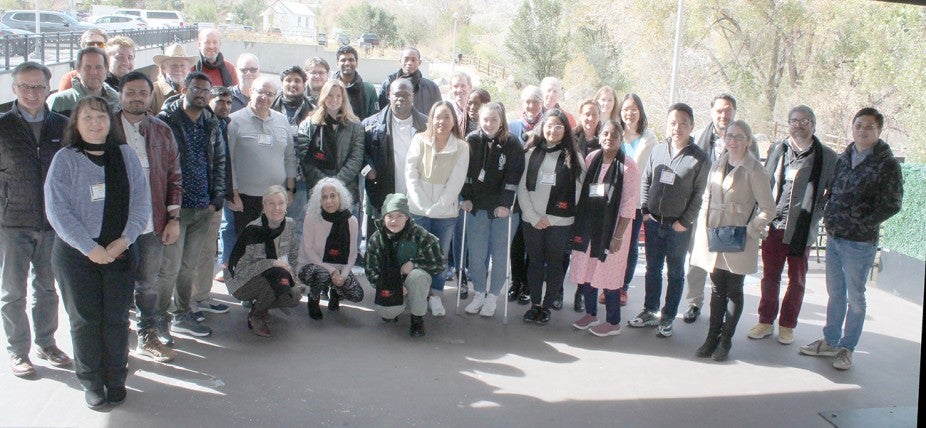
Some of the attendees of the 4th Eddy Cross-Disciplinary Symposium held in Golden, Colorado.
Work after the 4th Eddy Symposium is ongoing. The Working Groups are continuing with their brainstorming sessions and efforts to move science forward in the areas of: Exoplanets; Space Weather; and the Interconnection of Sun, Climate and Society with virtual meetings.
Borne from last year's Eddy Symposium was a white paper on "How Open Data and Interdisciplinary Collaboration Improve Our Understanding of Space Weather: A Risk & Resiliency Perspective," as well as a new publication in Frontiers. Learn more about this unique interdisciplinary symposium.
